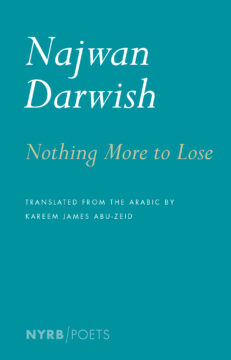Alexia Underwood at the Paris Review:
 “No one will know you tomorrow. / The shelling ended / only to start again within you,” writes the poet Najwan Darwish in his new collection. Darwish, who was born in Jerusalem in 1978, is one of the most striking poets working in Arabic today. The intimate, carefully wrought poems in his new book, , No One Will Know You Tomorrow, translated into English by Kareem James Abu-Zeid, were written over the past decade. They depict life under Israeli occupation—periods of claustrophobic sameness, wartime isolation, waiting. “How do we spend our lives in the colony? / Cement blocks and thirsty crows / are the only things I see,” he writes. His verses distill loss into a few terse lines. In a poem titled “A Brief Commentary on ‘Literary Success,’ ” he writes, “These ashes that were once my body, / that were once my country— / are they supposed to find joy / in all of this?” Many poems recall love letters: to Mount Carmel, to the city of Haifa. To a lover who, abandoned, “shares my destiny.” He speaks of “joy’s solitary confinement” because “exile has taken / everyone I love.” Irony and humor are present (“I’ll be late to Hell. / I know Charon will ask for a permit / to board his boat. / Even there / I’ll need a Schengen visa”), but it is Darwish’s ability to convey both tremulous wonder and tragedy that make this collection so distinct.
“No one will know you tomorrow. / The shelling ended / only to start again within you,” writes the poet Najwan Darwish in his new collection. Darwish, who was born in Jerusalem in 1978, is one of the most striking poets working in Arabic today. The intimate, carefully wrought poems in his new book, , No One Will Know You Tomorrow, translated into English by Kareem James Abu-Zeid, were written over the past decade. They depict life under Israeli occupation—periods of claustrophobic sameness, wartime isolation, waiting. “How do we spend our lives in the colony? / Cement blocks and thirsty crows / are the only things I see,” he writes. His verses distill loss into a few terse lines. In a poem titled “A Brief Commentary on ‘Literary Success,’ ” he writes, “These ashes that were once my body, / that were once my country— / are they supposed to find joy / in all of this?” Many poems recall love letters: to Mount Carmel, to the city of Haifa. To a lover who, abandoned, “shares my destiny.” He speaks of “joy’s solitary confinement” because “exile has taken / everyone I love.” Irony and humor are present (“I’ll be late to Hell. / I know Charon will ask for a permit / to board his boat. / Even there / I’ll need a Schengen visa”), but it is Darwish’s ability to convey both tremulous wonder and tragedy that make this collection so distinct.
more here.
Enjoying the content on 3QD? Help keep us going by donating now.
